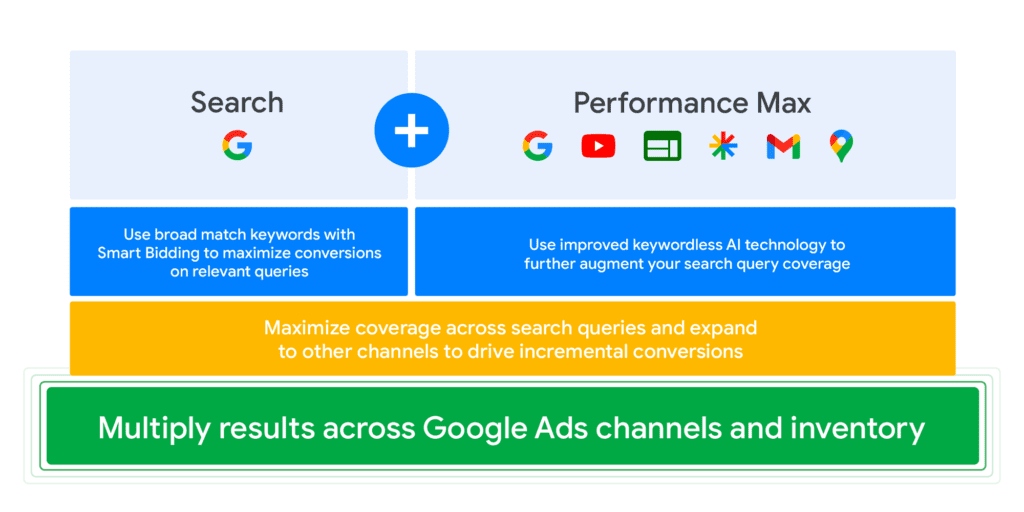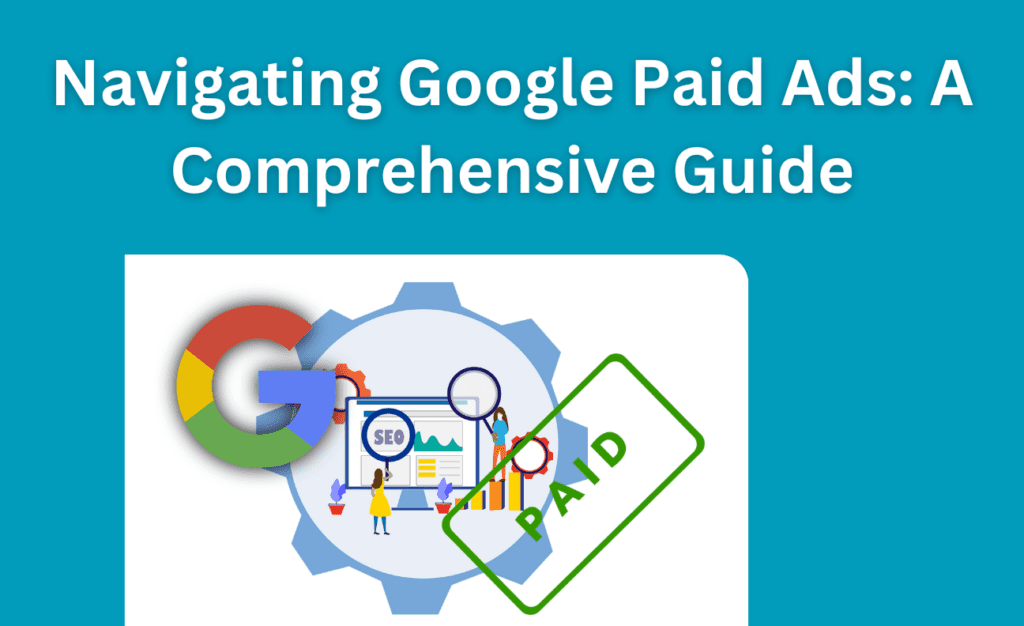Measuring the performance and effectiveness of multilayer digital marketing strategies is a crucial aspect of modern businesses. With the ever-evolving online landscape, tracking and optimising these strategies require robust tools and techniques.
Fortunately, Google Ads provides a wealth of valuable insights that can help businesses monitor and improve their multilayer digital marketing efforts.
In this blog post, we will delve into the power of Google Ads insights and explore how they can be used to track the performance of your multilayer digital marketing strategy effectively.
Google Ads: Why is it Relevant for my Business?
Google Ads, the online advertising platform developed by Google, allows businesses to create and display ads across various Google-owned properties, including the search engine results page, websites within the Google Display Network, YouTube, and more. With Google Ads, businesses can reach a vast audience of potential customers who are actively searching for products or services related to their industry.
There are several reasons why Google Ads is highly relevant for businesses:
Extensive Reach: Google is the most widely used search engine globally, with billions of searches conducted every day. By leveraging Google Ads, businesses can tap into this massive user base and reach potential customers at the exact moment they express interest in relevant products or services.
Targeted Advertising: Google Ads provides robust targeting options, allowing businesses to refine their audience based on factors such as keywords, location, demographics, and interests. This precision targeting helps businesses display ads to the most relevant audience, increasing the chances of generating quality leads and conversions.
Flexible Budgeting: Google Ads accommodates businesses of all sizes and budgets. It offers various bidding strategies, including cost-per-click (CPC), cost-per-thousand-impressions (CPM), and cost-per-acquisition (CPA), giving businesses the flexibility to choose the most suitable pricing model. Additionally, businesses can set daily or monthly budgets to control their ad spend effectively.
Performance Tracking & Optimization: Google Ads provides comprehensive performance metrics that allow businesses to track the effectiveness of their campaigns. With insights on impressions, clicks, conversions, and more, businesses can analyse data to optimise their ads, target the right audience, and improve return on investment (ROI).
"BENEFITS OF GOOGLE ADS"#googleads #google #benefits #measure #audience #remarking #potentialcustomer pic.twitter.com/dyEJeQ0tRD
— Vispansolutions (@Vispansolutions) June 22, 2020
Ad Formats and Extensions: Google Ads supports a wide range of ad formats, including text ads, image ads, video ads, and responsive ads. Additionally, businesses can leverage ad extensions to enhance their ads with additional information, such as location details, call buttons, and sitelink extensions. These features help businesses maximise visibility and engagement with potential customers.
Remarketing Capabilities: Google Ads enables businesses to implement remarketing campaigns, allowing them to target users who have previously visited their website or engaged with their brand. By staying top-of-mind with these potential customers, businesses can increase the chances of conversions and nurture leads throughout the customer journey.
Overall, Google Ads offers a powerful and versatile platform for businesses to promote their products or services effectively.
Using Google Ads for Tracking your Marketing Strategy
Google Ads provides a wealth of information about user behaviour, campaign performance, and conversion metrics, enabling businesses to make data-driven decisions and optimise their marketing efforts.
Setting Up Conversion Tracking
Defining Conversion Goals
To effectively track the performance of your multilayer digital marketing strategy, it’s crucial to set up conversion tracking in Google Ads. Start by defining your conversion goals, which could include website purchases, form submissions, newsletter sign-ups, or any other action that aligns with your marketing objectives.
Implementing Conversion Tracking Code
Google Ads provides a conversion tracking code snippet that needs to be placed on the relevant pages of your website. This code tracks user interactions and sends data back to Google Ads, allowing you to measure the success of your marketing campaigns in terms of conversions.
Analysing Campaign Performance
Campaign Metrics Overview
Google Ads offers various metrics to assess the performance of your multilayer digital marketing campaigns. Key metrics include impressions, clicks, click-through rate (CTR), average position, cost per click (CPC), and conversion rate. Analysing these metrics will help you evaluate the overall effectiveness of your campaigns.
Segmentation and Comparison
Segmenting your campaigns based on different parameters such as demographics, devices, locations, or time of day can provide valuable insights into the performance of each layer in your multilayer digital marketing strategy. By comparing the metrics across these segments, you can identify trends, strengths, and weaknesses to optimise your targeting and messaging.
Utilising Audience Insights
Audience insights refer to the valuable information and data obtained from analysing user demographics, interests, behaviours, and characteristics, which can be used to understand and target specific segments of your target audience more effectively in your digital marketing strategies.
Audience Demographics
Google Ads offers demographic data about your audience, including age, gender, household income, and interests. This information is crucial in tailoring your marketing strategy to target specific customer segments effectively. By analysing the demographic insights, you can refine your ad messaging, adjust your targeting options, and optimise your budget allocation.
Remarketing Opportunities
With Google Ads, you can create remarketing lists based on user behaviour on your website or app. By segmenting your audience into different lists, you can target specific messages to users who have already shown interest in your brand or products. Remarketing allows you to stay top-of-mind and bring back potential customers who might not have converted during their initial visit.
Optimising Keyword Performance
Keyword performance refers to the evaluation and assessment of how well specific keywords are performing in terms of generating impressions, clicks, and conversions in your digital marketing campaigns.
Keyword Analysis
Keywords are the foundation of any digital marketing campaign. Google Ads provides detailed insights into keyword performance, including search terms, impressions, clicks, and conversions. By analysing this data, you can identify high-performing keywords and optimise your bidding strategy accordingly. Additionally, you can uncover negative keywords that are driving irrelevant traffic and adjust your campaigns to minimise wasted ad spend.
Quality Score and Ad Rank
Google Ads assigns a quality score to each keyword, which impacts your ad position and cost per click. By monitoring your quality scores, you can identify keywords with low scores and optimise your ad copy and landing pages to improve relevancy. Increasing your quality scores can lead to higher ad rankings and lower costs, ultimately improving the performance of your multilayer digital marketing strategy.

Integrating Google Analytics
Google Analytics is a web analytics platform that provides detailed data and insights on website or app performance, user behaviour, and conversion metrics, helping businesses make informed decisions and optimise their online presence.
Linking Google Ads and Google Analytics
By linking your Google Ads account with Google Analytics, you can gain deeper insights into user behaviour and website performance. This integration provides a comprehensive view of how your multilayer digital marketing campaigns contribute to website traffic, engagement, and conversions.
It enables you to track specific actions, such as page views, time on site, or completed goals, allowing you to optimise your marketing efforts based on user behaviour.
Analysing Multi-Channel Funnels
Google Analytics’ Multi-Channel Funnels feature provides invaluable insights into the customer journey and the impact of different marketing channels on conversions. By understanding how users interact with various touch points before converting, you can refine your multilayer digital marketing strategy, allocate budgets effectively, and optimise the customer experience.
Conclusion
Tracking the performance of your multilayer digital marketing strategy is essential for driving results and achieving your business objectives. Google Ads Insights offers a powerful set of tools and metrics that enable you to monitor and optimise your campaigns effectively.
By leveraging conversion tracking, analysing campaign performance, utilising audience insights, optimising keyword performance, and integrating Google Analytics, you can unlock the true potential of your multilayer digital marketing strategy and drive meaningful results for your business.









